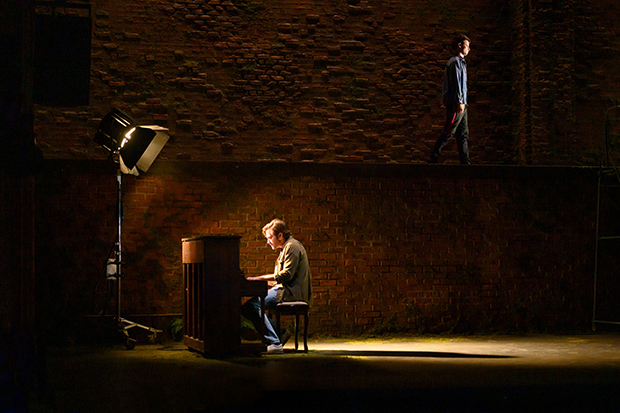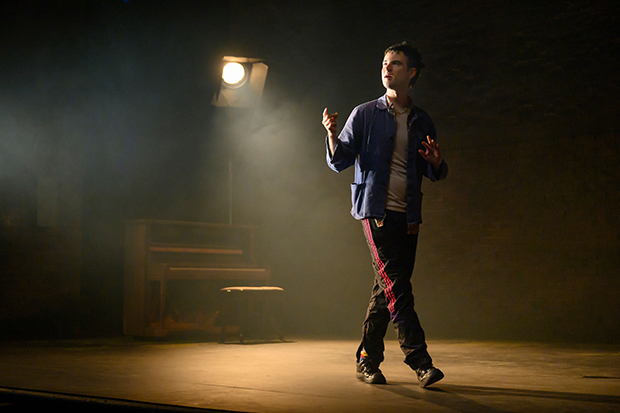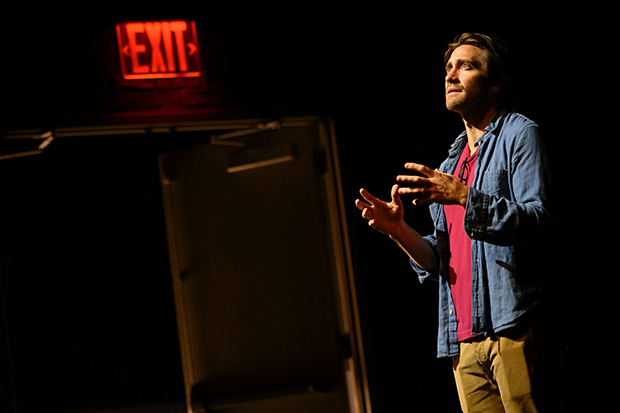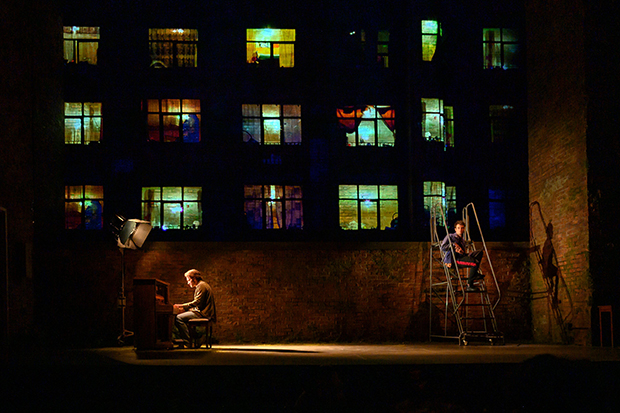Sea Wall / A Life, Jake Gyllenhaal / Tom Sturridge, Life / Death
The two actors return to Broadway for a double bill of solo plays.

(© Hubert Smith)
The plays Sea Wall and A Life wouldn't be on Broadway right now if famous people weren't in them. Simon Stephens's 45-minute solo play, Sea Wall, and Nick Payne's monologue of the same length, A Life, are not the kind of shows one typically associates with Broadway — especially in August. Two serious meditations on life and death, they are likelier to appear under the banner of a not-for-profit theater, or as a reading rather than full production. So it is admirable that Tom Sturridge and Jake Gyllenhaal have come to the Hudson Theatre (where both have previously performed in recent years) with this double bill. Directed by Carrie Cracknell, the link between the two shows remains as tenuous as it felt when they appeared together at the Public Theater (the plays debuted separately in London). While both traffic in universal human experiences, one feels infinitely more tragic than the other.
That would be Sea Wall, which comes first. Sturridge plays Alex, a British photographer who spends holidays with his wife and their young daughter at his father-in-law's house in the South of France. A veteran of Northern Ireland and the Falklands War, his father-in-law is a gruff old soldier who has been completely disarmed by his charming granddaughter. Everyone has. Sturridge speaks of their interactions in a haunted past tense, his sentences regularly trailing off before he changes the subject. Sturridge's performance has matured since the off-Broadway run, and he is particularly convincing in portraying the lingering pain in Alex. "There's a hole running through the center of my stomach," he says, broaching the subject. "You must have all felt a bit awkward because you can probably see it." Not only that, but we can hear and feel it, too.

(© Hubert Smith)
Despite valiant attempts by Sturridge, Sea Wall is almost completely mirthless, which makes sense considering its subject matter. Thankfully, A Life has plenty of laughs — and Gyllenhaal knows how to deliver them. He plays Abe, a father who describes the birth of his daughter, while also recounting the death of his own father. Adopting distinct voices for his wife and the assorted medical staff and helpful neighbors that he meets along the way, Gyllenhaal is able to bring a cast of characters to vivid life within the format of a confessional monologue. Anyone who has experienced the birth of a child or death of a parent (which is nearly everybody of a certain age) will relate to his palpable anxiety and joy.
Cracknell puts her two actors in their respective driver's seats, which is wise for performance-driven pieces like these. She could even do less. Her production is nearly indistinguishable from the one she helmed at the Public Theater, despite a partial overhaul of the design team: Laura Jellinek's two-tier empty (but not really) theater set remains the most noticeable element. The one major difference is that now, patches of flora spring from the bricks during the second half. They are mostly unseen in the darkness of Guy Hoare's shadowy lighting. Hoare and sound designer Daniel Kluger effectively collaborate to clarify the script of A Life, using a high-pitched ring and a bump in the lights to signify when Abe is switching from talking about the birth of his daughter to the death of his father.

(© Hubert Smith)
The costumes have also been revamped, with Christopher Peterson now working with original costume designer Kaye Voyce. They have taken the advice of Coco Chanel and wisely removed several layers from Sturridge's costume, and I suspect that the performer is grateful to no longer be sweltering under the stage lights, clad in such a heavy metaphor. Gyllenhaal's costume is also new, with his denim shirt echoing the one worn by Sturridge in the first half. Denim, it seems, is the fabric of our lives.
Cracknell seems especially keen to emphasize the universality of these stories, something projection designer Luke Halls hammers home with the final image of an ever-expanding sea of apartment windows. This could happen to any one of us, they seem to be saying; but Gyllenhaal and Sturridge have made that perfectly clear in their performances. The nice thing about casting a celebrity in your show is that you know why people are buying tickets, and it's not for the production values. Counterintuitive though it may be on Broadway, for plays like these, less is more.

(© Hubert Smith)







